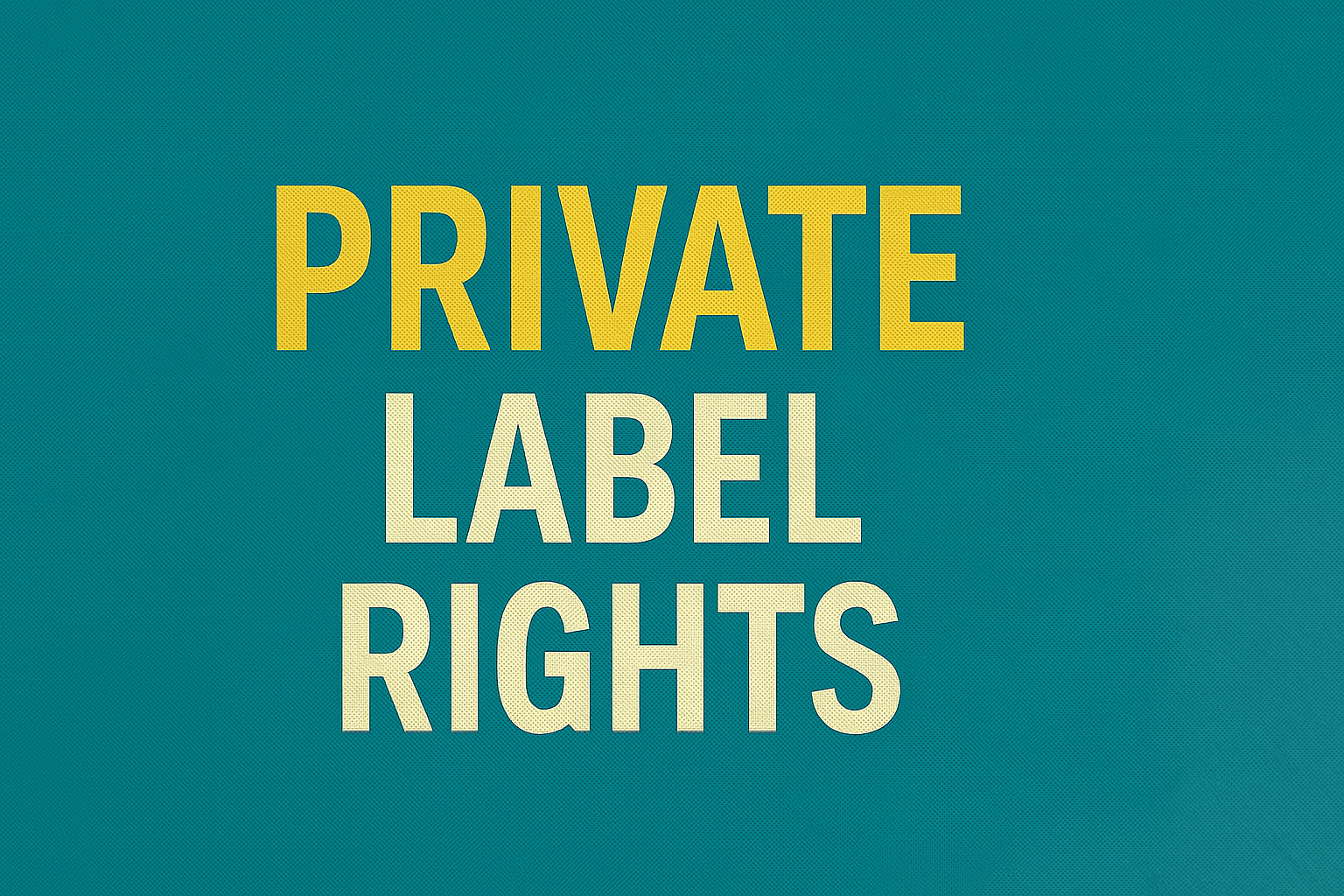How to Build an Ecommerce Business With Private Label
Products
So you want to build an ecommerce business and think private label products are the way to go. Smart move. Private labeling lets you sell unique products under your own brand without having to actually manufacture anything yourself. You find a generic product from a supplier, slap your logo on it, and voila - you've got your own branded merchandise to sell at a healthy profit margin. The best part is once you've found a winning product, you can scale fast since you're not reinventing the wheel each time. If this sounds like an intriguing business model to you, read on. We're going to show you exactly how to source private label products, build your brand, and launch a profitable ecommerce store. By the end of this, you'll have the skills and confidence to start your own private label empire.
What Is Private Labeling and How Does
It Work?
So you want to start an ecommerce business but don't want to deal with creating your own products from scratch? Private labeling is a great solution.
Private labeling is when you source generic products from a manufacturer, then customize and rebrand them to sell as your own. ###How it works
- Find a product to sell. Look for generic goods used by a wide audience. Things like supplements, cosmetics, electronics accessories, and clothing basics are all great options.
- Locate a reputable manufacturer. Search online or use a sourcing agent to find factories that produce the type of product you want to sell. Get samples from a few to compare quality and pricing.
- Negotiate a manufacturing agreement. Work with your chosen supplier to determine minimum order sizes, customization options, pricing, delivery details and timelines. You want an agreement that benefits you both.
- Design your brand and product packaging. Create your brand logo, product name, and any custom packaging to differentiate from the original generic goods. This helps build your brand and customer loyalty.
- Market and sell your products. With a unique brand and high-quality private label products in hand, start selling on your own ecommerce store, online marketplaces, and even in brick-and-mortar retail stores.
Selling private label products is an easy way to launch or expand an ecommerce business without investing in product development up front. Find popular goods your customers already want, make them your own, and get ready to build your brand and boost your bottom line. The opportunities are endless!
Finding the Right Manufacturer and
Supplier for Your Private Label Products
Once you’ve decided on private label products to sell, it’s time to find a manufacturer and supplier to work with. This relationship is key to your business, so take your time and do it right.
Finding Potential Suppliers
Search online for manufacturers in your product category. Check independent review sites to see ratings and check if they do private label work. Get samples from a few to compare quality and pricing.
- Look for suppliers with good communication, certified factories, and transparency into their supply chain and manufacturing process.
- Make sure they can meet your volume needs and have a track record of high-quality, on-time production.
Visiting the Factory (If Possible)
If feasible, visiting the factory in person is the best way to evaluate a potential supplier. You can see their operation firsthand and make sure they meet required standards and certifications. Meet with key contacts to build the relationship and understanding.
Negotiating a Deal
Once you find suppliers you want to work with, it’s time to negotiate. Get detailed quotes for different volumes to determine the best deal. Discuss minimum order quantities, lead times, payment terms, shipping, and returns policies.
- Aim for good quality at the best price. Don’t just go for the lowest bidder.
- Start with a trial run of a small order to test the supplier before committing to a long-term partnership.
With the right manufacturing partner in place, you’ll be well on your way to building a successful private label business. Take the time to choose wisely and forge a lasting relationship built on trust and quality. Your customers will thank you!
Tips for Designing and Branding Your
Private Label Products
Designing eye-catching yet affordable private label products is key to building your ecommerce business. Here are some tips to create products that will resonate with your target customers:
Focus on High-Demand Niches
Look for product categories that are in demand and growing, like fitness accessories, kitchen tools, or tech gadgets. These evergreen niches have built-in audiences that are constantly looking for new items. Do some research on Google Trends and Amazon to see what’s popular.
Keep Costs Low
Aim for a healthy profit margin by finding inexpensive manufacturers, especially those overseas. Check sites like Alibaba, Global Sources, and Made-in-China for suppliers. Have samples made to ensure good quality before placing a large order.
Create Simple but Attractive Designs
Keep your designs minimalist, functional and visually appealing. For example, neutral or earthy colors, natural materials, and a clean yet stylish look may resonate with eco-friendly customers. Add your logo and branding to make the products uniquely your own.
Build Your Brand
Develop a memorable brand for your ecommerce store that is conveyed through your products. Use the same color palette, logo placement, and overall esthetic for a cohesive brand image. This branding will make your private label products instantly recognizable to customers.
Optimized Listings
Write persuasive product listings for your ecommerce store that highlight the key features, specifications, and benefits to customers. Include high-quality photos from multiple angles. SEO-optimized listings with relevant keywords will help your products rank higher in search engines like Google.
Following these tips will help you design and brand private label products that attract new customers and keep your existing customers coming back for more. With a little work on the front-end, you'll have a line of products ready to take your ecommerce business to the next level.
Marketing Strategies to Promote Your
Private Label Products and Brand
To successfully promote your private label products, you’ll want to focus on a few key marketing strategies.
Build an Email List
Start building an email list of interested customers as soon as you launch your store. Offer an incentive like a coupon code or free shipping for subscribers. Email marketing is one of the most effective ways to stay in touch with your customers and promote new products.
Run Retargeting Ads
Retargeting, also known as remarketing, allows you to show ads to people who have already visited your website. Since these visitors are already familiar with your brand, they are more likely to convert. You can run retargeting ads on platforms like Facebook, Instagram, and Google Ads.
Increase Product Visibility
Make sure your products appear in as many places as possible online. This includes optimizing your product pages for search engines, running Google Shopping ads, and distributing your products to other retailers. The more exposure your products get, the more sales you’ll make.
Run Social Media Ads
Social media platforms like Facebook and Instagram offer advertising options for ecommerce businesses. Run ads promoting your private label products to target audiences that match your customer profiles. Keep testing different creative and audiences to improve your results over time.
Start an Affiliate Program
An affiliate program allows other influencers and websites to promote your products for a commission. This is an easy way to increase visibility and drive more sales through recommendations from others. Reach out to influencers and websites in your niche to see if they want to join your new affiliate program.
Improve Product Reviews
Product reviews build trust and credibility which leads to more sales. Make it easy for happy customers to leave reviews on your website, Google, Facebook and anywhere else your products are listed. Respond to both positive and negative reviews professionally and use them as an opportunity to improve.
Scaling Your Ecommerce Business With
Private Labeling
Once you’ve built up a collection of private label products, it’s time to scale your ecommerce business. This means reaching more customers and increasing your sales and profits.
Optimize Your Website
Make sure your website is optimized for search engines and the user experience. Use tools like Google Analytics to see how people are finding your site and what they're interested in. Include important keywords in your page titles, URLs, headings, and content. Provide high-quality product photos, descriptions, and reviews. These improvements will help increase organic traffic from search engines like Google.
Run Promotional Campaigns
Run promotions and sales to boost traffic and sales. Offer site-wide discounts, free shipping, buy one get one deals or weekly flash sales. Promote your sales through social media, email newsletters, and retargeting ads. These types of campaigns significantly impact revenue and are a key way to scale.
Start Selling on Marketplaces
Selling your private label products on large ecommerce marketplaces like Amazon, eBay, and Walmart is an easy way to scale. You'll gain access to their massive built-in audiences and established infrastructure. However, you'll typically pay sizeable commissions and fees. Consider if increased sales will offset the costs before jumping in.
Build a Strong Brand
Work on building brand recognition and loyalty. Choose a memorable business name and logo and use them consistently across your store, products, and marketing. Provide high-quality customer service and foster a positive brand reputation. Run social media ads, start an email newsletter, and build partnerships with influencers to increase brand exposure. These brand-building efforts establish credibility and trust which leads to more repeat customers and word-of-mouth marketing.
Scaling an ecommerce business takes time and continuous effort but following these proven strategies can help significantly grow your revenue and customer base. Keep testing and optimizing to find what works best for your niche and products. With hard work and persistence, you'll be on your way to building a successful private label brand.
Conclusion
So there you have it, the key steps to building a successful ecommerce business with private label products. It will take work, but by finding high-quality products, building a memorable brand, optimizing your online store, and providing great customer service, you'll be well on your way to creating a thriving business. Private labeling gives you the freedom and flexibility to create the company you've always wanted. While it may seem daunting, if you start small, focus on continuous improvement, and persist through challenges, you'll get there. Before you know it, you'll have an ecommerce business making sales around the clock and putting money in your pocket even while you sleep. The possibilities are endless if you take that first step. What are you waiting for? Get out there and start building your brand today. You've got this!
Sign Up for Think It - Plan It - Do It Newsletter and Get the
The Blogging Guide to Six-Figure Retirement for Free

